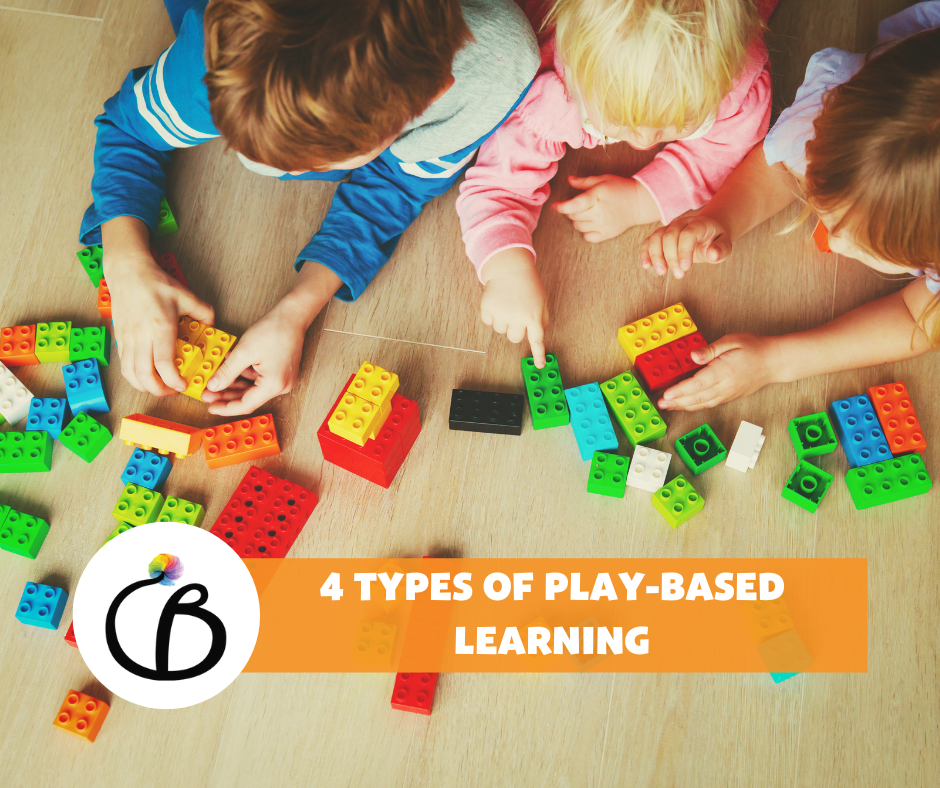Many of us think of the word “play” as fun and games. However, play goes far beyond those two things. Playtime allows children to discover the world around them. As children play, they engage their imagination, take risks, and learn problem solving skills to support their development.
What is play-based learning?
Play-based learning is simply using play as a context for learning. This takes place when parents create an environment in which play is the natural setting for exploring and discovering new things. Play-based learning is child-initiated and parent supported. Your role is to encourage your child to learn through interactions that expand their thinking!
Benefits of play-based learning
Learning through play helps children develop their social and emotional skills, build confidence and motivation, and practicing cognitive skills. Here are some benefits of play-based learning:
- Enhances language development: One of the greatest benefits of play-based learning is enhancing children’s literacy and language development. Play-based learning allows children to learn new words and practice their language skills in an organic and relevant way. This allows them to build connections and engage in different forms of playful and reciprocal conversations.
- Sparks creativity and imagination: Fostering imagination and creativity in children at a young age allows them to explore and develop their problem solving skills and interpersonal skills.
- Builds social and emotional skills: Play-based learning has a significant impact on children’s social and emotional development. This type of learning helps them learn how to manage their emotions, feelings, and how to communicate their needs with others.
- Establishes a positive attitude towards learning: Incorporating play into your child’s daily life helps develop a positive attitude towards learning. When children enjoy their learning environment, they are more likely to be driven by their interests and curiosity and want to explore new things.
- Promotes motor skill development: Play helps children hone their fine motor skills and physical abilities. Through activities such as drawing, painting, jumping, throwing, catching, and balancing, children are able to enhance their physical development.
Types of play-based learning
Play-based learning not only makes learning fun but also fosters creativity, problem-solving, and social skills. Here are four types of play-based learning for kids:
- Constructive play: Constructive play involves building and creating with various materials like blocks, Legos, and puzzles. It encourages children to use their imagination and problem-solving skills to design structures and solve spatial challenges. This type of play enhances fine motor skills, spatial awareness, and logical thinking.
- Imaginative play: Imaginative play, also known as pretend or dramatic play, involves role-playing scenarios from real life or the child’s imagination. This type of play can include dressing up, playing house, or creating elaborate stories with action figures. It helps kids explore social roles and develop empathy and language skills.
- Outdoor play: Outdoor play provides kids with the opportunity to explore and interact with the natural world. Whether it’s climbing trees, playing in a sandbox, or going on a nature hike, outdoor play enhances physical development, sensory perception, and an appreciation for nature.
- Sensory play: Sensory play involves activities that stimulate the senses: touch, taste, smell, sight, and hearing. Examples include playing with playdough, finger painting, or exploring sensory bins filled with various materials. Sensory play helps kids build cognitive and sensory processing skills.
Play-based learning is a powerful educational tool that engages children’s natural curiosity and creativity. By incorporating these four types of play-based learning into a child’s daily routine, parents can promote holistic development, laying a strong foundation for lifelong learning. Remember, the key is to let kids lead the way, offering guidance and support when needed but allowing them to explore and learn through play!
For more play-based learning activities and ideas, follow Curious B.E.I.N.G.s on Facebook and Instagram and subscribe to the Curious B.E.I.N.G.s newsletter.




